Why does it hurt "down there" when having a menstrual period?
"Auntie" usually refers to menstruation. Pain during menstruation may be caused by uterine contractions, psychological stress, pelvic inflammatory disease, vaginitis, endometriosis, and other factors. If experiencing severe discomfort, prompt medical attention is recommended. Detailed explanations are as follows:

1. Uterine Contractions: During menstruation, the uterus undergoes periodic contractions to help expel the endometrium and blood. These contractions may cause mild lower abdominal pain or discomfort. This is a normal physiological phenomenon and generally not a cause for concern. Applying a hot water bag or warm compress to the lower abdomen can help alleviate the pain caused by uterine contractions.
2. Psychological Stress: Emotional factors such as stress, anxiety, or depression may lead to physical discomfort during menstruation, including mild pain in the genital area. It is recommended to practice deep breathing, yoga, meditation, or other techniques to relieve tension, adjust mindset, and maintain a positive and optimistic mood.
3. Pelvic Inflammatory Disease: Pelvic inflammatory disease may be caused by bacterial infection, leading to inflammation of organs within the pelvis. The pain may worsen during menstruation and may be accompanied by symptoms such as fever and increased vaginal discharge. It is recommended to follow medical advice and use medications such as amoxicillin capsules, cefradine capsules, or azithromycin capsules to alleviate symptoms.
4. Vulvitis: Inflammation of the vulva may cause local congestion and swelling. Besides a pruritic sensation, there may also be tenderness upon pressure. Initially, the vulvar area can be wiped 1–3 times with iodophor for disinfection. If necessary, your doctor may recommend adjunctive treatment with herbal washes such as Sophora flavescens solution or metronidazole chlorhexidine wash to accelerate inflammation resolution. Antifungal medications such as nystatin tablets, fluconazole tablets, or itraconazole capsules may also be used under a doctor's guidance.
5. Endometriosis: Endometriosis refers to the growth of endometrial tissue outside the uterine cavity, possibly due to retrograde menstrual flow. These displaced tissues also bleed during menstruation but cannot be expelled as normal menstrual blood, thus causing pain and discomfort. Pain and inflammation can be managed by following medical advice and taking medications such as ibuprofen sustained-release capsules, diclofenac sodium sustained-release tablets, or meloxicam tablets.
During menstruation, women should maintain cleanliness and dryness of the vulva, frequently change sanitary pads and underwear, and avoid prolonged dampness in the genital area, which increases the risk of bacterial invasion. Additionally, maintaining a regular sleep schedule, balanced diet, and moderate exercise as part of a healthy lifestyle can also help alleviate menstrual discomfort.




